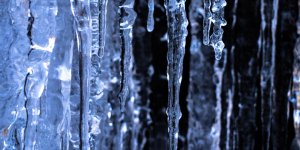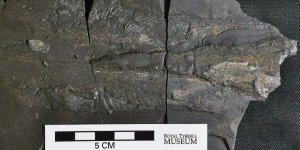Science News

Modified natural materials will be an essential component of a sustainable future, but first a detailed understanding of their properties is needed. »

Researchers develop bioplastic using cassava starch and ozone gas. »

Low concentrations of antibiotics in the environment can have major impacts on gut bacteria. »

Genes may allow some insects to adjust their biological clocks, survive shorter winters. »

Scientists study clams and seagrass meadows along tropical coasts. »

Discovery means simpler and cheaper manufacturing methods are actually beneficial for the material’s use in next-generation solar cells or LED lighting. »

Watermelon is one of the world’s most popular fruits. But there are six other wild species of watermelon, all of which, however, have pale, hard and bitter fruits. »

How small is the tiniest possible particle of ice? According to new research, the smallest nanodroplet of water in which ice can form is only as big as 90 water molecules -- a tenth the size of the smallest virus. »

Male birds of species that form long-lasting pair-bonds often continue to make elaborate displays of plumage, color and dance after they mate with a female, encouraging the female to invest more energy into their brood. »

Some of the world's most exquisite fossil beds were formed millions of years ago during time periods when Earth's oceans were largely without oxygen. »

Scientists have developed an investigational vaccine that protected cynomolgus macaques against four types of hemorrhagic fever viruses endemic to overlapping regions in Africa. »

Researchers manufacture micro-doughnuts that mimic swimming bacteria for biomedical purposes. »

Research offers evidence that DNA-sharing may be far more common than thought. »

Researchers suggest that you can reduce the risk of early death no matter how many hours you clock up a week or how fast you run. »

Dangers to ancient Antarctic ice portend a future of rapidly rising seas, but a new study may relieve one nagging fear. Meltwater ponds fracturing the ice below them may not cause protracted chain reactions that unexpectedly collapse floating ice shelves. »

USDA Red, the world's first true red spinach variety has been developed and released by the Agricultural Research Service. »

Too many hours looking at smartphones and tablets 'slows down toddlers' language and reading development because it changes the structure of their brains. »

Scientists from the University of Granada have used magnetic materials in “smart” asphalts that modify their properties in the presence of external magnetic fields. »

Antarctica's ice sheet spans close to twice the area of the contiguous United States. Its land boundary is buttressed by massive, floating ice shelves extending hundreds of miles out over the frigid waters of the Southern Ocean. »

Scientists from the University of Granada, the IGME, and the Universities of Cologne and Lisbon have demonstrated that the careo irrigation channels of Sierra Nevada constitute the oldest underground aquifer recharge system on the continent. »

A new study led by researchers at the University of Miami Rosenstiel School of Marine and Atmospheric Science and the Institute of Marine Research in Norway found that European glass eels use their magnetic sense to "imprint" a memory of water currents in the estuary where they become juveniles. »

When waves break in the ocean, they inject tiny particles into the air, called aerosols, that carry organic molecules more than 5,000 years old. »

You'd think that losing 25 percent of your genes would be a big problem for survival. But not for red algae, including the seaweed used to wrap sushi. »

A new lithium-ion battery design makes it possible for electric vehicle drivers to charge their cars and hit the road in as little as ten minutes, according to a new study. »

Scientists at the Great Lakes Center for Fresh Waters and Human Health showed that shifts in metabolic functions of freshwater cyanobacteria present in toxic algal blooms take place according to the time of day. »

Researchers have identified 57 genetic variations of a gene strongly associated with declines in blood oxygen levels during sleep. »

Scientists designed the first test to detect dysphagia, a disorder that prevents sufferers from swallowing while eating, among patients with cognitive problems. »

Earth system scientists from the University of California, Irvine have identified another culprit when a river overflows its banks: leafy plants. »

A study of lemur scents conducted by researchers at Duke University finds that an individual's distinctive body odor reflects genetic differences in its immune system and that other lemurs can detect these differences by smell. »

Cambridge researchers have captured the visible nanostructure of living wood for the first time using an advanced low-temperature scanning electron microscope. »

Newly created strontium, an element used in fireworks, detected in space for the first time following observations with ESO telescope. »

Cells undergo natural aging and death, processes that impact a multitude of cellular factors. A new Stony Brook University-led study provides a biophysical model that reveals how with age, damage accumulates in the shapes of cellular proteins and triggers death. »

Aftershocks of a powerful earthquake with reported magnitude 6.3 that struck southern Philippines on Wednesday night have increased the death toll of the extended event from five people to six due to a massive landslide following a 5.0 magnitude aftershock on Saturday. »

A new study found that overweight men who exercised before eating breakfast burned twice the fat of those who exercised after breakfast. »

New research published by scientists at the Woods Hole Oceanographic Institution shows that polystyrene, one of the world's most ubiquitous plastics, may degrade in decades or centuries when exposed to sunlight, rather than thousands of years as previously thought. »

Scientists have discovered an antibiotic produced by a soil bacterium in a Mexican tropical forest that may help lead to a "plant probiotic." »

A widely-used gas that is currently produced from fossil fuels can instead be made by an ‘artificial leaf’ that uses only sunlight, carbon dioxide and water, and which could eventually be used to develop a sustainable liquid fuel alternative to petrol. »

Local fish catch could help reduce nutrient deficiencies in developing countries — but only if more of it is distributed regionally. »

A study describes a new rapid assay for Lyme disease that could lead to a practical test for use by healthcare providers. »

Nanoparticles (particles just a few hundred atoms in size) are ending up in the environment by the ton, but scientists are still unclear about the long-term effects of these super-small particles. »

A new study by chemists at the University of Arkansas shows that X-ray crystallography, the standard method for determining the structure of proteins, may provide inaccurate information about a critical set of proteins -- those found in cell membranes -- which in turn could be leading to poor and inefficient drug design. »

Researchers from the University of Colorado at Boulder (CU Boulder) in Colorado and the College of Wooster in Ohio reported a new mechanism by which warm ocean currents erode the ice shelves along the coast of Antarctica, contributing to the planet's rising oceans. »

Materials so small they make nanomaterials look like behemoths. »

NIH mouse study could prompt scientists to rethink how benzodiazepines work. »

Scientists find that eastern U.S. forest complexity improves carbon capture. »

A promising replacement for the toxic and flammable greenhouse gases that are used in most refrigerators and air conditioners has been identified by researchers from the University of Cambridge. »
Researchers have successfully used sound waves to control quantum information in a single electron, a significant step towards efficient, robust quantum computers made from semiconductors. »

Astronomers have spotted three giant black holes within a titanic collision of three galaxies. »

Hotter temperatures mean birds need more water to cool off -- if it's available. »

Scientists determining how today's corn plants will respond to future ozone levels. »